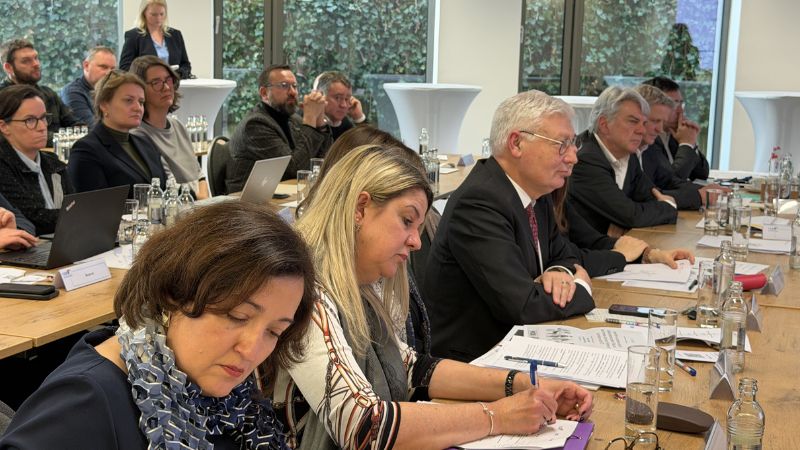CESI in Belgrade: Strengthening gender equality in Serbia and the healthcare sector
.jpeg)

.jpeg)

On May 8th, 2025, CESI marked a landmark moment for healthcare trade union cooperation, gender equality, and Serbia’s EU integration in Belgrade.
On May 8th, 2025, CESI, with the support of its Serbian member, the Association of Physicians and Pharmacists of Serbia (SLFS), marked a landmark moment for healthcare trade union cooperation, gender equality, and Serbia’s EU integration in Belgrade.
CESI’s Expert Commission on ‘Healthcare Services’ (SAN) met and elected its new leadership. As part of the eQualPro project, the meeting addressed urgent policy matters in the healthcare sector in Europe, as well as gender equality and the digital transformation of healthcare systems in Serbia.
European and Serbian stakeholders discussed gender biases in AI and their effects on recruitment, promotion, and training; best practices on gender-sensitive health workforce reforms; and EU-backed tools for equality and inclusion in digital transition efforts.
Klaus Heeger, CESI Secretary General, opened the session by calling for overdue investments in resilient and better-staffed healthcare systems, warning that no society can withstand crises or demographic shifts without a strong care workforce.
The commission then elected its new leadership:
- President: Paloma Repila (SATSE, Spain)
- Vice-Presidents: Gorica Djokić (SLFS, Serbia) and Joost Veldt (CNV Connectief, The Netherlands)
Different speakers highlighted the challenges in the healthcare sector regarding quality health care, staff shortages, and gender equality.
Paloma Repila emphasised the need to empower women in leadership and ensure equity, solidarity, and well-being in trade union agendas. Greet Vermeylen (European Commission) presented key points from the EU’s Gender Equality Strategy 2020–2025, calling for a persistent focus on closing the gap in working conditions for women.
Margrieta Langins (WHO Europe) addressed nursing shortages and stressed the importance of integrating gender policies into workforce planning. Alba Bernini (Joint Research Centre) highlighted data-driven planning as critical to achieving sustainable, equitable health access across Europe.
New research on staff shortages was unveiled by Tadas Leoncikas (Eurofound), urging immediate measures to attract and retain healthcare workers. Oliver Krzywanek (komba/dbb) explained Germany’s new Nursing Assistance Act, noting that structural changes are needed to reduce part-time work and improve conditions for women in caregiving.
Finally, Jelena Šapić (Reshaping Work) and Federica Margheri (European Health Management Association) discussed the dual potential of AI to support care delivery and exacerbate bias—urging inclusive, ethical implementation.
Meeting with Secretary of State Ivana Stasević Karličić
In a separate political meeting, Klaus Heeger and Gorica Djokić met with Ivana Stasević Karličić, Secretary of State at Serbia’s Ministry of Health.
The meeting focused on strengthening social dialogue in the healthcare sector, improving collective bargaining rights, and enhancing gender equality and working conditions in healthcare.
Secretary Stasević Karličić welcomed the delegation and affirmed Serbia’s commitment to inclusive social dialogue.
A Shared Commitment and Vision
The day concluded with the adoption of the CESI Expert Commission’s latest position on EU Health Union priorities, with strong joint messages:
- Staff up and skill up – Europe needs binding staffing standards, cross-border recognition, and a bold EU Care Pact to fight chronic understaffing and protect both patients and professionals.
- Put mental health on the agenda – Make employer-provided support and psychosocial risk assessments a legal requirement to tackle burnout and safeguard well-being in the healthcare sector.
- Close the gender gap now – Enforce pay transparency, promote women into leadership, and value unpaid care work to build a fair and inclusive health workforce for the future.

Image Gallery
CESI in Belgrade: Strengthening gender equality in Serbia and the healthcare sector
Related videos
Similar Posts


Building future-ready civil protection workplaces in Athens
At CESI’s eQualPRO event in Athens, stakeholders exchanged on how digitalisation and artificial intelligence are transforming civil protection services and how social dialogue can help ensure fair, inclusive and future-ready workplaces.
Get in touch
with us
Confédération Européenne des Syndicats Indépendants (CESI)
Contact form
Stay up to date
Don’t miss a thing and subscribe to our newsletter
Subscribe now and receive newsletters and much more!



